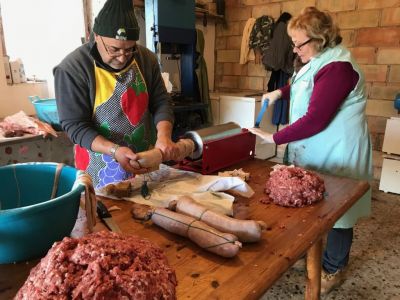When Peppe told me the December date for the transformation of his butchered pig into prosciutto, capocollo, sausages, salami, coppa, and lard, I knew I would be there. At 84-years-old, Peppe is the oldest of our rural neighbors to continue this nearly-disappearing winter ritual. Fewer are working the land (and raising pigs) and increasingly, Italians are becoming more health-conscious about pork consumption, the quantity of salt in their foods and so on. On my way over to Peppe’s farm, memories awoke of past times and pig slaughters at my family’s old farmhouse. When I arrived, the garage door was open and a huge soot-blackened copper cauldron with a battered improvised lid squatted outside the open garage door. I knew that the coppa would be simmering in the cauldron’s boiling water. In the garage, Peppe’s daughter, Paola, and her husband, Aleandro, were at work on the meat from the pig slaughtered the previous day. Slicing pork with swift strokes, Paola turned to me with a smile and “Ciao, Anna” as I entered. A blue, plastic basin of pork-filled plastic bags, ready for the freezer, sat on a chair. As Paola sliced and chopped, the pork was separated into two piles: one would be ground for ammazzafegato salami and the other for sausages. Clearly, the pile on the right with bits of darker meats was for the ammazzafegato. The name “liver-killer” indicates one of the ingredients, the pig liver, which joins the pork meat and other organs.
Peppe was chopping garlic cloves to put in a plastic cup full of his red wine. The garlicky wine would be used to season the salami, sausages and also the prosciutti and capocollo. In a room off the garage, prosciutti, pancetta (bacon) and capocolli were laid out on wooden racks. Peppe tenderly, almost reverently, poured wine into crevices in those fat prosciutti. Then, just as tenderly, he rubbed the meats with lard and ground black pepper, patting the capocolli affectionately. Peppe then packed those prosciutti generously in salt. “They’ll stay here 50 days under salt and then 10 days pressed under weight before we hang them to age for at least a year,” Peppe explained after the salting. We then walked back to the stall where his aged prosciutti were hanging. Below them, acorns spread out like a bumpy carpet. I remember hours under our oak trees gathering acorns in November and December years ago. Anyone raising pigs knows that acorn-fed ones will make the best prosciutti. Every fall, Peppe spreads out nets under his oaks to capture acorns, unlike years ago when he and his wife, Gentile, spent months of afternoons on their knees rapidly clawing handfuls of acorns into gunny sacks.
Peppe has gathered so many acorns that they cover the floors of three of his storerooms wall-to-wall, including the room with the freezer and the steel canisters filled with their olive oil. Back in the garage, Aleandro was grinding pig fat for lard (Paola would use it to baste meats). He then weighed the meats for the ammazzafegato salami and then for the sausages, for the salt used must be proportionate to the weight of the pork meat. Paola then weighed the salt and the grinding started. As the ammazzafegato salami churned out of the grinder, Aleandro seemed to hug that ground meat as he gently drew it towards himself to form a pile. He grinned as he added the garlic-seasoned wine to it. The pig intestines, already well-cleaned with the vinegar Peppe makes, would be the salami casings and were attached to the opening of another machine. Paola fed in the ground meat and Aleandro gripped the slow-filling casings tying them at intervals with strings to create individual salamis. After tying the salamis, Aleandro used Peppe’s homemade, artisanal picchiarello (“object making little pricks”) to perforate the casings – for best aging of the meats. Peppe gently carried the salami, cradling each almost like a newborn, into his adjacent wine cellar for aging. He laid them gently, side-by-side on a pristinely clean white sheet, telling me that “qui si riposano per tre giorni e poi, li appendiamo” (“here they rest for three days and then we hang them up”). I noted such gentility, respect and almost reverence for all that Peppe, Paola and Aleandro handled during that day. Peppe’s pig had also merited the same.



